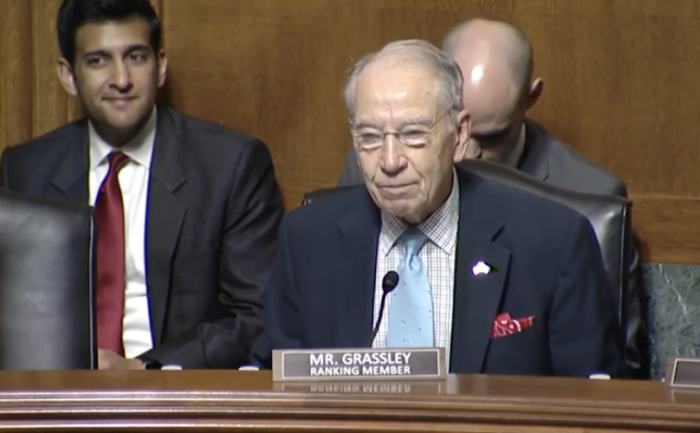Senator Chuck Grassley promoted stereotypes about Asian Americans during a U.S. Senate Judiciary Committee hearing on October 6. Staff later said the senator’s remarks about Korean people were meant “to be complimentary” to U.S. District Court Judge Lucy Koh. But the “model minority” myth harms Asians as well as other people of color.
Koh has served as a federal judge in California since 2010 and is up for a seat on the Ninth Circuit Court of Appeals. Grassley, who is the committee’s ranking Republican, spent most of his allotted time questioning Koh about her judicial philosophy and her ruling in the Tandon case, which involved restrictions on home-based religious gatherings as part of California’s COVID-19 mitigation policies.
Before getting to those legal issues, Grassley alluded to part of Koh’s opening remarks. Here’s the video, from the senator’s official YouTube channel.
My transcript:
Grassley: Judge, welcome. What you said about your Korean background reminds me a lot of what my daughter-in-law of 45 years has said. And if I learned anything from Korean people, it’s the hard work ethic, and how you can make a lot out of nothing. So I congratulate you and your people.
Koh: Thank you.
The Huffington Post’s Jennifer Bendery was first to report on Grassley’s remarks.
Grassley spokesperson Taylor Foy later told HuffPost the senator’s comment was intended “to be complimentary” to Koh and not meant to insult anyone.
“Chairman Durbin invited Judge Koh to share the inspiring story of her family’s immigration to the United States,” said Foy. “Sen. Grassley shared that he has similarly been inspired by the immigration story of his daughter-in-law, who is also Korean-American.”
Koh had described some of her family’s history. That’s very different from suggesting that all Koreans or Korean-Americans have similar qualities.
Like many white Americans, Grassley and his spokesperson seem to believe people of color should be flattered when someone expresses a positive stereotype about their heritage or community. But research has documented the model minority myth harms Asian Americans in many ways.
In addition, white people have frequently used the stereotype as a “racial wedge” to imply that other marginalized groups, especially Black people, are to blame for persistent inequities, because they supposedly lack the “work ethic” of Asian Americans.
Koh’s ethnicity is not irrelevant to her nomination. She would be the first Korean-American woman to serve on any federal appeals court, and she told senators expanding diversity on the bench would send “a very powerful message.” It’s worth noting that Grassley voted to confirm Koh to her first judgeship in 2010 (that Senate vote was unanimous). He was also among four committee Republicans who voted to advance Koh’s nomination yesterday, though he did not commit to supporting her on the Senate floor.
But congratulating Koh and “your people” is not celebrating diversity. U.S. Representative Judy Chu, who chairs the Congressional Asian Pacific American Caucus, criticized Grassley’s remarks, telling Bendery, “Even if you think you’re being complimentary, assigning any character trait to an entire community is the definition of prejudice.”
By erasing differences among individuals, the model minority myth fuels overt racist beliefs about Asians and other groups, as well as implicit bias toward people imagined to reflect the innate good or bad qualities of their communities. Ask any person of Asian descent who grew up in Iowa or has lived here for any length of time. They have stories to share about comments like Grassley’s, and it’s unlikely they recall those incidents in a positive way.
The Iowa senator’s apparent fascination with immigration stories popped up during a later portion of the Judiciary Committee’s October 6 hearings. Grassley used his time to ask Armando Bonilla, a nominee for the U.S. Court of Federal Claims, about his family’s life in Cuba and emigration from that Communist country. He even interrupted to ask whether Bonilla’s older relatives ever described “the oppression they had in Cuba.” In contrast, the senator’s questions to Jonathan Kanter, a white man nominated to lead the Antitrust Division of the Department of Justice, focused entirely on policy questions, such as antitrust enforcement in the agricultural sector and with respect to prescription drugs.

